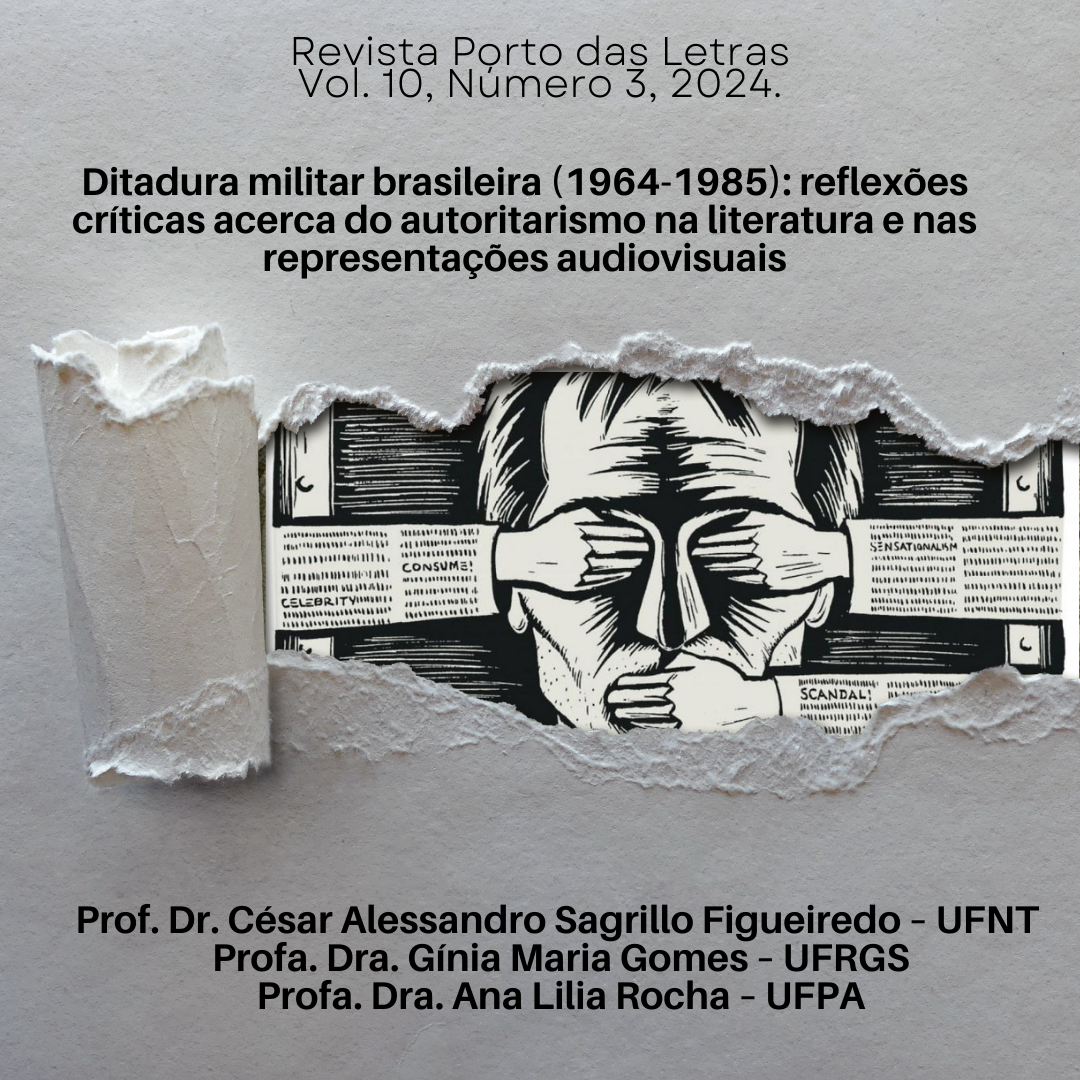“Sem corpo não há rito, não há nada”:
as vozes narrativas e o espaço em K. Relato de uma busca, de Bernardo Kucinski
DOI:
https://doi.org/10.20873.24.404Keywords:
Testemunho;, K. Relato de uma Busca, Luto.Abstract
In the novel K: Relato de uma busca (2011), by Bernardo Kucinski, the imminence of testimony is evident - which also implies the threat of its impossibility (SELIGMANN-SILVA, 2008) - as well as the endless work of mourning an absent body. In this sense, the work, faced with loss as its fundamental axis, presents specific ways of telling the unspeakable reality, so that this struggling testimony, emerging from the necessity/impossibility of narration, manifests itself above all in the representation of voices and in the space of the narrative. From this perspective, the aim is to reveal how the tension between impossibility and necessity drives the composition of the narrator and the space in K: Relato de uma busca. Furthermore, the specific objectives are to analyze how the conflict of narrative voices in K constructs the representation of violence and the truth of traumatic events, and to investigate how space traces the breadth of the character's mourning. To sum up, the novel not only presents, metalinguistically, the abysses of literary creation, but also specificities in the elements of the narrative in the face of loss: whether in space, revealing the dimensions of absence, or in ellipsed voices. In the latter, the impossibility of narrating the traumatic experience, an indispensable aspect of the testimonial narrative, mobilizes the various other voices (tentacularity), triggering other narrators. Prosthetic memory, that is, the appropriation of other people's memories, supplements the unspeakable truth and contributes to the composition of the work.
References
ALVES, Adão Marcelo Lima Freire. A perda da autoridade do narrador como recurso formal na representação da violência em K. relato de uma busca, de Bernardo Kucinski. Entreletras. Araguaína, Vol. 12, N. 1, p. 102-117, jan./abr. 2021.
ARAUJO, Amanda Arruda Venci. Memória e ficção em K. - relato de uma busca. Revista Iluminart. São Paulo, Ano VII, N. 13, p. 19-32, dez. 2015.
BENJAMIN, Walter. O narrador. In: BENJAMIN, Walter. Magia e técnica, arte e política: ensaios sobre literatura e história da cultura. Tradução Sérgio Paulo Rouanet. 7ª. Ed. São Paulo: Brasiliense, 1994.
FOUCAULT, Michel. Ditos e escritos V: Ética, Sexualidade, Política. Tradução Elisa Monteiro. 1ª Ed. Rio de. Janeiro: Editora Forense Universitária, 2004.
_________________. História da sexualidade 1: a vontade de saber. Tradução Maria Thereza da Costa Albuquerque. 13ª Ed. Rio de Janeiro: Edições Graal, 1999.
FREUD, Sigmund. Luto e melancolia. Tradução Marilene Carone. São Paulo: Cosac Naify, 2011.
GAGNEBIN, Jeanne Marie. Lembrar escrever esquecer. São Paulo: Editora 34, 2009.
KOSMINSKY, Ethel V. Os judeus no bairro do bom retiro (São Paulo: 1925-1955). Cadernos CERU. São Paulo, Série 2, N. 13, p. 47-71, 2002.
KRISTEVA, Julia. Sol negro. Tradução Carlota Gomes. 2 ed. Rio de Janeiro: Rocco, 1989.
KUCINSKI, Bernardo. K. Relato de uma busca. São Paulo: Cosac Naify, 2014.
LEITE, Ligia Chiappini Moraes. O foco narrativo (ou A polêmica em torno da ilusão). São Paulo: Ática, 1991.
LIMA, Rogério. A memória negativa e a vida necessária. In: PERERIA, Helena Bonito (org.). Ficção brasileira no Século XXI: história, memória e identidade. 1. ed. São Paulo: Editora Mackenzie.
LINS, Osman. Lima Barreto e o espaço romanesco. São Paulo: Ática, 1976.
OLIVEIRA, Pamella. O trauma precisa virar ficção: um olhar sobre o teor testemunhal da obra K. Relato de uma busca, de Bernardo Kucinski. Cadernos do IL. Porto Alegre, N.57, p. 64-78, nov. 2018.
PACHECO, Thiago Sampaio. As múltiplas vozes na constituição de K.: relato de uma busca, de Bernardo Kucinski. Fórum Lit. Bras. Contemporânea. Rio de Janeiro, Vol. 13, N. 25, p. 155-78, jun. 2021.
ROSSI, Paolo. O passado, a memória, o esquecimento: seis ensaios da história das ideias. Tradução Nilson Molin. São Paulo: Editora UNESP, 2010.
SAMWAYS, Daniel. O que eles dizem, o que eles fazem: a construção do inimigo vermelho e anticomunismo na ditadura civil. Contemporâneos-Revista de artes e Humanidades. São Paulo, N. 11, p.1-23, nov. 2012/abril 2013.
SARMENTO-PANTOJA, Augusto. O testemunho em três vozes: testis, superstes e arbiter. Literatura e Cinema de Resistência. Santa Maria, N. 32, p. 5-18, jan./jun. 2019.
SELIGMANN-SILVA, Márcio. Narrar o trauma – a questão dos testemunhos de catástrofes históricas. Psicologia Clínica. Rio de Janeiro, Vol. 20, N. 1, p. 65-82, 2008.
__________, Márcio. História, memória e literatura: o testemunho na Era das Catástrofes. Campinas: Ed. Unicamp, 2003.
WALDMAN, Berta. O texto como lápide. Cadernos de Língua e Literatura Hebraica. São Paulo. N. 11, ago. 2014.
Downloads
Published
How to Cite
Issue
Section
License
Os autores concordam com os termos da Declaração de Direito Autoral, que se aplicará a esta submissão caso seja publicada nesta revista (comentários ao editor podem ser incluídos a seguir).

